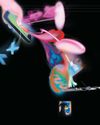
One day in 1992, near the northern pole of a planet hurtling around the Milky Way at roughly 500,000 miles per hour, Kelly Drew was busy examining some salmon brains in a lab. Her concentration was broken when Brian Barnes, a zoophysiology professor from down the hall at the University of Alaska Fairbanks, popped by her bench for a visit. With a mischievous grin, he asked Drew-a neuropharmacologist early in her career to hold out her hands and prepare for a surprise. A moment later, she felt a hard, furry lump deposited in her palms. It was some sort of brown rodent with dagger-like claws, curled up into a tight ball and so cold to the touch that Drew assumed it was dead. To her astonishment, Barnes gleefully explained that it was actually in perfect health.
The creature, an Arctic ground squirrel, was just hibernating, as it does for up to eight months of the year. During that span, the animal's internal temperature falls to below 27 degrees Fahrenheit, literally as cold as ice. Its brain waves become so faint that they're nearly impossible to detect, and its heart beats as little as once per minute. Yet the squirrel remains very much alive. And when spring comes, it can elevate its temperature back to 98.6 degrees in a couple of hours.
Drew cradled the unresponsive critter in her hands, unable to detect even the faintest signs of life. What's going on inside this animal's brain that allows it to survive like this? she wondered. And with that question, she began to burrow into a mystery that would carry her decades into the future.
This story is from the December 2022 - January 2023 edition of WIRED.
Start your 7-day Magzter GOLD free trial to access thousands of curated premium stories, and 9,000+ magazines and newspapers.
Already a subscriber ? Sign In
This story is from the December 2022 - January 2023 edition of WIRED.
Start your 7-day Magzter GOLD free trial to access thousands of curated premium stories, and 9,000+ magazines and newspapers.
Already a subscriber? Sign In

MOVE SLOWLY AND BUILD THINGS
EVERYTHING DEPENDS ON MICROCHIPS-WHICH MEANS TOO MUCH DEPENDS ON TAIWAN. TO REBUILD CHIP MANUFACTURING AT HOME, THE U.S. IS BETTING BIG ON AN AGING TECH GIANT. BUT AS MONEY AND COLOSSAL INFRASTRUCTURE FLOW INTO OHIO, DOES TOO MUCH DEPEND ON INTEL?

FOLLOW THAT CAR
CHASING A ROBOTAXI FOR HOURS AND HOURS IS WEIRD AND REVELATORY, AND BORING, AND JEALOUSY-INDUCING. BUT THE DRIVERLESS WORLD IS COMING FOR ALL OF US. SO GET IN AND BUCKLE UP.

REVENGE OF THE SOFTIES
FOR YEARS, PEOPLE COUNTED MICROSOFT OUT. THEN SATYA NADELLA TOOK CONTROL. AS THE COMPANY TURNS 50, IT'S MORE RELEVANT-AND SCARIER-THAN EVER.

THE NEW COLD WARRIOR
CHINA IS RACING TO UNSEAT THE UNITED STATES AS THE WORLD'S TECHNOLOGICAL SUPERPOWER

CALIFORNIA DREAMIN'
KINDRED MOTORWORKS VW BUS - Despite being German, the VW T1 Microbus is as Californian as the Grateful Dead.

THE INSIDE SCOOP ON DESSERT TECH
A lab in Denmark works to make the perfect ice cream. Bring on the fava beans?

CONFESSIONS OF A HINGE POWER DATER
BY HIS OWN estimation, JB averages about three dates a week. \"It's gonna sound wild,\" he confesses, \"but I've probably been on close to 200 dates in the last year and a half.\"

THE WATCHFUL INTELLIGENCE OF TIM COOK
APPLE INTELLIGENCE IS NOT A PLAY ON \"AI,\" THE CEO INSISTS. BUT IT IS HIS PLAY FOR RELEVANCE IN ALL AREAS, FROM EMAIL AUTO-COMPLETES TO APPS THAT SAVE LIVES.

COPYCATS (AND DOGS)
Nine years ago, a pair of freshly weaned British longhair kittens boarded a private plane in Virginia and flew to their new home in Europe.

STAR POWER
The spirit of Silicon Valley lives onat this nuclear fusion facility's insane, top-secret opening ceremony.